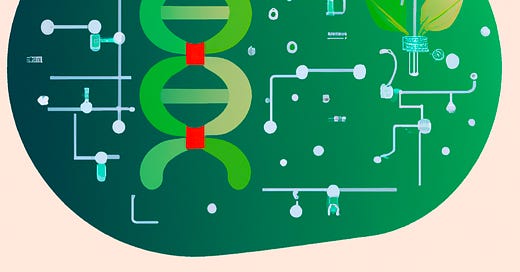Five disciplines in Biology to watch out for in 2023
These disciplines show promise for major breakthroughs this year
Biology is poised for significant advances in 2023. With the continued growth of technologies like CRISPR, single-cell sequencing, and artificial intelligence, we can expect discoveries in fields ranging from genetics to ecology. Let’s look at some potential breakthroughs in the coming year.
1) New Discoveries in Human Genetics:
In 2023, we can expect to see continued progress in human genetics. Specifically, we may see more insights into the genetic basis of complex traits like diseases. This could include identifying specific genetic variants that contribute to these traits and a better understanding of how these variants interact with environmental factors to shape disease outcomes. In particular, we may continue to see the rise of personalized medicine. This could lead to the development of new treatments that are tailored to an individual's genetic makeup.
2) Advancements in Synthetic Biology:
Synthetic biology is an interdisciplinary field that combines biology, engineering, and computer science to create new biological systems or modify existing ones. In 2023, we may see even more impressive advances in this field. For example, we may see the creation of new materials like bio-based plastics that are more sustainable and environmentally friendly than traditional plastics.
We may also see new treatments for diseases that use engineered cells or organisms. For example, researchers may develop new CAR-T cell therapies that use genetically engineered immune cells to target cancer cells. Additionally, we may see new biofuels or bioremediation techniques that use engineered microbes to break down pollutants or produce renewable energy.
3) A Deeper Understanding of the Microbiome:
The microbiome is the collection of microorganisms that live within and on the human body. In recent years, research has shown that the microbiome plays a crucial role in human health. In 2023, we may see even more insights into the workings of the microbiome.
For example, researchers may identify new microbial species important for human health. They may also develop new treatments for conditions like inflammatory bowel disease or obesity that target the microbiome. Additionally, we may see new insights into how the microbiome impacts mental health, with research exploring the connection between gut health and conditions like depression and anxiety.
4) Progress in Neuroscience:
Neuroscience is the study of the brain and nervous system, and in recent years, there have been significant advancements in our understanding of these complex systems. In 2023, we can expect to see even more progress in this field.
One area of focus may be the genetics of neurological disorders. Researchers may identify new genetic variants that contribute to conditions like Alzheimer's disease or epilepsy. Additionally, we may see new treatments for these conditions that target specific genetic pathways.
We may also see new technologies emerge that allow us to study brain function better. For example, researchers may develop new non-invasive brain imaging techniques that provide more detailed information about brain activity. This could lead to new insights into how the brain processes information and how we form memories.
5) Breakthroughs in Ecology and Conservation:
As the global climate crisis continues, ecology and conservation have become increasingly important. In 2023, we may see discoveries in areas like biodiversity, conservation genetics, and ecosystem management.
For example, researchers may develop new techniques for restoring damaged ecosystems. This could include using engineered microbes to break down pollutants or using drone technology to plant trees in areas that have been deforested. Additionally, we may see new policies and regulations aimed at protecting endangered species and habitats, such as establishing new national parks or creating marine protected areas.
As we look ahead to 2023, the field of biology is poised to make significant advances in our understanding of the natural world. From human genetics to ecology and conservation, we can expect to see discoveries that will profoundly impact our lives and our planet. While we can't predict precisely what breakthroughs will occur, it's clear that the field of biology is full of exciting possibilities for the future.
Connect with Genomely!
Substack: Genomely from Jacob L. Steenwyk
Twitter: @Genomely
GitHub: GenomelyBio
Connect with me!
Twitter: @jlsteenwyk
Website: jlsteenwyk.com





